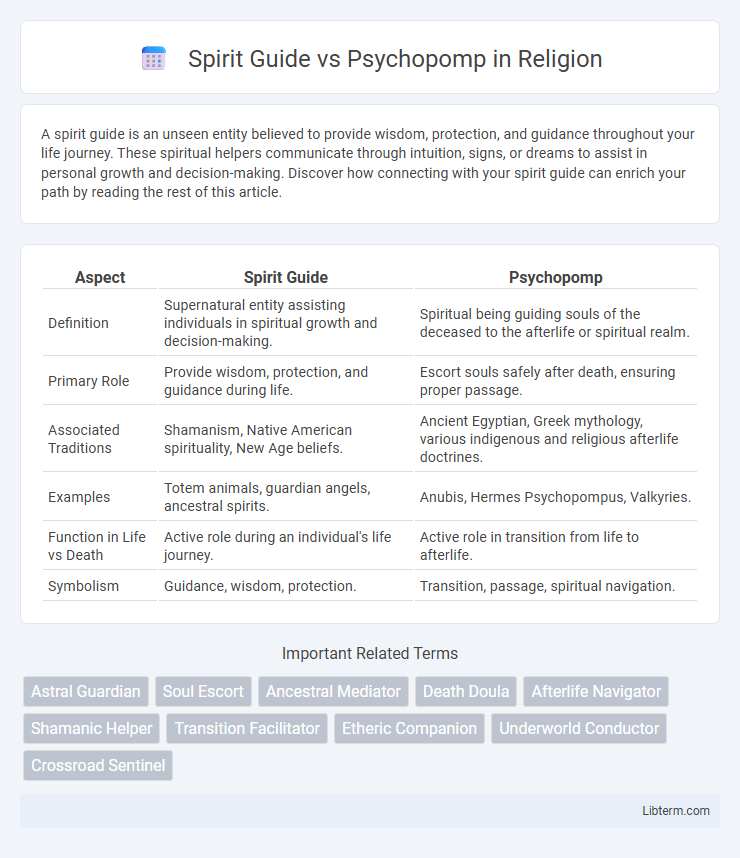A spirit guide is an unseen entity believed to provide wisdom, protection, and guidance throughout your life journey. These spiritual helpers communicate through intuition, signs, or dreams to assist in personal growth and decision-making. Discover how connecting with your spirit guide can enrich your path by reading the rest of this article.
Table of Comparison
| Aspect | Spirit Guide | Psychopomp |
|---|---|---|
| Definition | Supernatural entity assisting individuals in spiritual growth and decision-making. | Spiritual being guiding souls of the deceased to the afterlife or spiritual realm. |
| Primary Role | Provide wisdom, protection, and guidance during life. | Escort souls safely after death, ensuring proper passage. |
| Associated Traditions | Shamanism, Native American spirituality, New Age beliefs. | Ancient Egyptian, Greek mythology, various indigenous and religious afterlife doctrines. |
| Examples | Totem animals, guardian angels, ancestral spirits. | Anubis, Hermes Psychopompus, Valkyries. |
| Function in Life vs Death | Active role during an individual's life journey. | Active role in transition from life to afterlife. |
| Symbolism | Guidance, wisdom, protection. | Transition, passage, spiritual navigation. |
Understanding Spirit Guides: Roles and Purpose
Spirit guides serve as benevolent entities that offer wisdom, protection, and guidance throughout an individual's spiritual journey, helping to navigate life's challenges and personal growth. Psychopomps, by contrast, are specialized spiritual beings tasked with escorting souls during the transition between life and the afterlife, ensuring safe passage to the next realm. Understanding their distinct roles clarifies how spirit guides focus on ongoing life assistance while psychopomps facilitate the soul's journey after death.
Defining Psychopomps: Gateways to the Afterlife
Psychopomps serve as essential spiritual entities guiding souls through the transition from life to afterlife across diverse cultures, often depicted as winged beings, animals, or deities like Anubis in Egyptian mythology. Unlike spirit guides who offer ongoing wisdom and support during life, psychopomps specialize in navigating the soul's passage through death's liminal spaces and ensuring safe arrival in the spiritual realm. This role positions psychopomps as critical intermediaries and protectors within death rites and eschatological belief systems worldwide.
Key Differences Between Spirit Guides and Psychopomps
Spirit guides function as protective and instructional entities assisting individuals throughout life, offering wisdom and guidance for personal growth and decision-making. Psychopomps specifically serve as spiritual escorts for souls transitioning from the physical realm to the afterlife, ensuring safe passage and stability in the spirit journey. While spirit guides focus on ongoing support and enlightenment, psychopomps are primarily concerned with death-related spiritual navigation.
Cultural Perspectives on Spirit Guides and Psychopomps
Spirit guides and psychopomps hold distinct roles across diverse cultural traditions, with spirit guides commonly seen as protective and advisory beings assisting individuals on personal spiritual journeys, while psychopomps function primarily as intermediaries aiding souls' transition to the afterlife. Indigenous cultures, such as Native American and African spiritualities, often emphasize lifelong relationships with spirit guides who provide insight and guidance during life challenges. In contrast, ancient Egyptian and Greek mythologies highlight psychopomps like Anubis and Hermes, respectively, as crucial figures responsible for escorting the deceased safely to the realm of the dead.
Spiritual Communication: How Spirit Guides Interact
Spirit guides serve as spiritual mentors, offering wisdom and guidance through intuitive communication, dreams, and meditative states, facilitating personal growth and soul development. Psychopomps are primarily spiritual beings that escort souls during transitions between physical life and the afterlife, ensuring safe passage and helping navigate the spiritual realms. Both entities play crucial roles in spiritual communication, with spirit guides focusing on ongoing life lessons while psychopomps assist in critical transitional experiences.
The Journey of Souls: Psychopomps in Myth and Legend
Psychopomps play a crucial role in The Journey of Souls, guiding departed spirits safely to the afterlife across various mythologies, including Greek Hermes and Egyptian Anubis. Unlike spirit guides who provide wisdom during life, psychopomps specifically facilitate the transition after death, ensuring souls avoid obstacles and reach their designated spiritual realm. Their presence embodies the cultural beliefs surrounding death and the soul's passage, reflecting a universal archetype in human storytelling.
Signs and Symbols: Identifying Your Spiritual Helpers
Spirit guides often appear through subtle signs such as feathers, repetitive numbers, or specific animals symbolizing protection and wisdom. Psychopomps are typically identified by symbols related to transition and passage, like keys, bridges, or owls, which indicate their role in guiding souls between realms. Recognizing these spiritual helpers involves attentiveness to recurring motifs in dreams, meditations, or everyday encounters that resonate personally with transformation or guidance.
Spirit Guides in Modern Spirituality
Spirit guides in modern spirituality serve as benevolent entities offering protection, wisdom, and personal growth support, often believed to communicate through intuition and signs. Unlike psychopomps, whose primary role is guiding souls to the afterlife, spirit guides actively assist individuals during their earthly journey, enhancing spiritual development. Contemporary spiritual practices incorporate spirit guides as essential allies for meditation, healing, and navigating life challenges.
Psychopomps in Shamanic and Religious Traditions
Psychopomps serve as spiritual guides that escort souls to the afterlife across various shamanic and religious traditions, ensuring safe passage between the physical and spiritual worlds. In shamanism, psychopomps often take the form of animal spirits or deities helping shamans navigate the soul's journey during rituals and healing sessions. Religious traditions such as ancient Egyptian, Greek, and Tibetan Buddhism also emphasize psychopomps as essential intermediaries facilitating transitions from life to the afterlife or rebirth.
Finding Your Connection: Spirit Guides vs Psychopomps
Finding your connection with spirit guides involves tuning into intuitive messages, dreams, or synchronicities that provide ongoing guidance throughout life's journey. Psychopomps, conversely, serve as transitional helpers in the afterlife, guiding souls from the physical world to the spiritual realm with a focus on passage rather than daily support. Understanding these distinct roles enhances your ability to recognize when you are receiving wisdom for living versus assistance for crossing over.
Spirit Guide Infographic

 libterm.com
libterm.com